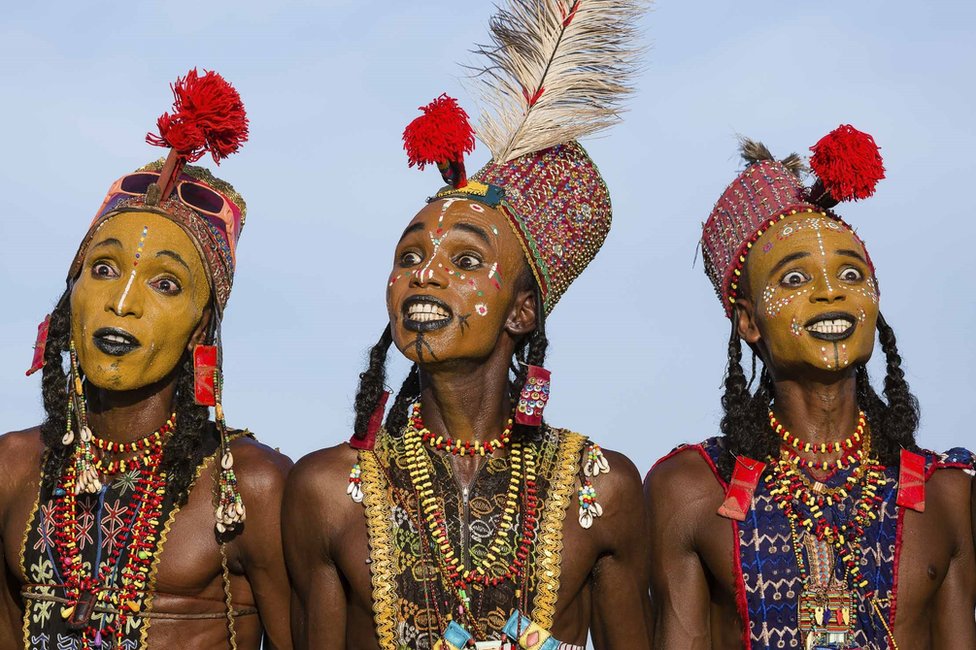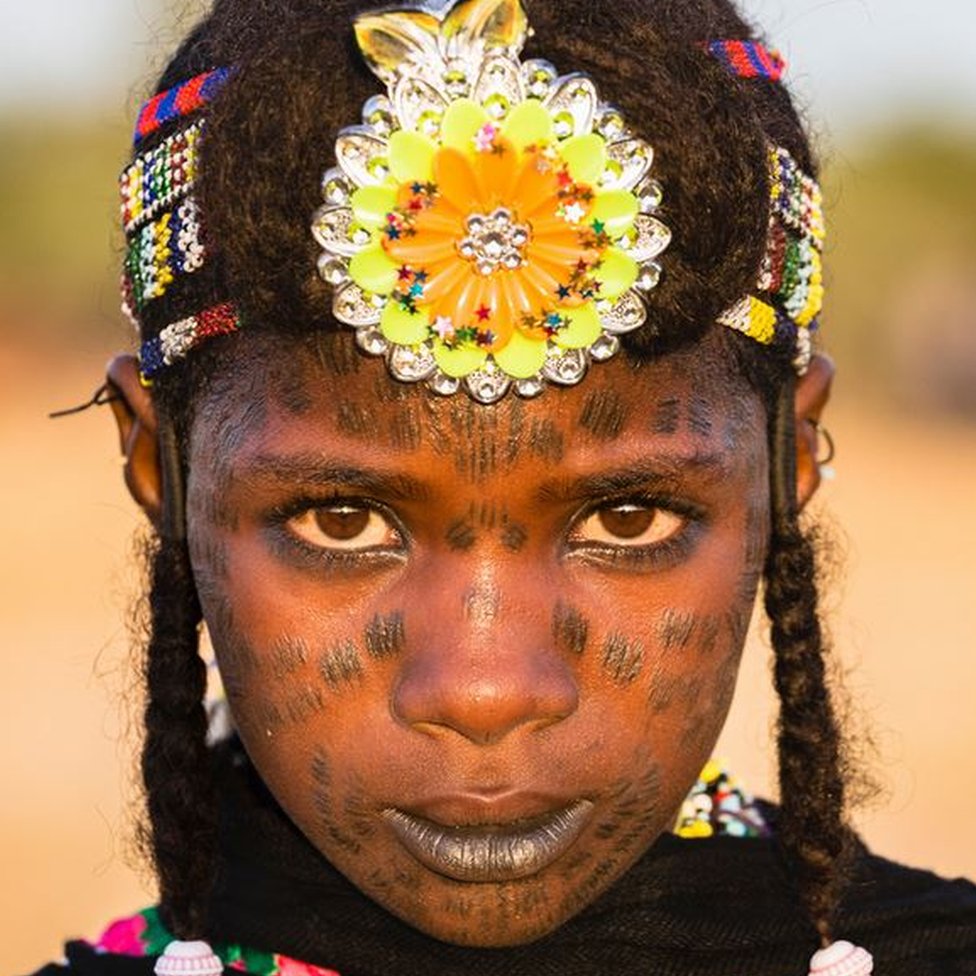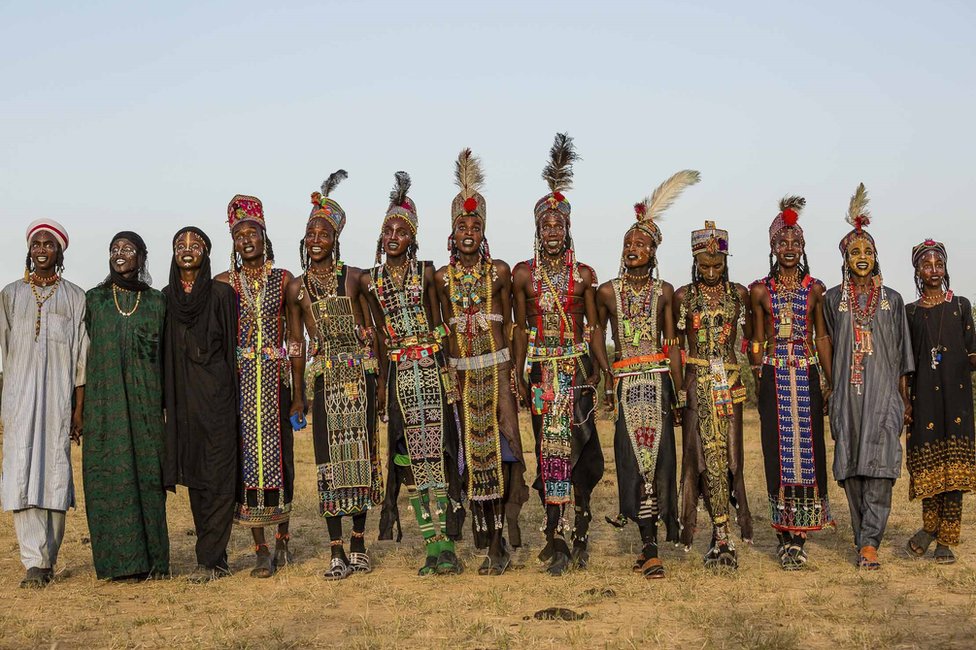In both beauty pageants and our culture in general it is normal for girls and women to try and look their best-and then be judged by a group of people. They spend tons of money and time picking the right clothes, the right makeup, and the right hair style. Yet, in the nomadic Wodaabe tribe, this is the opposite. The Wodaabe tribe are cattle-herders and are a part of the Fulani ethnic group of West Africa. This nomadic tribe is largely Islamic and over the years has migrated through Cameroon, Niger, Chad, and Nigeria. One of the most notable things about the Wodaabe is that they place a high emphasis on beauty and the way they form relationships with each other. It is the man’s job to form a relationship with and impress the woman. So the men are the ones that spend large amounts time into making themselves beautiful. The beauty standards for men (and sometimes women as well) emphasizes tallness, an elongated forehead, white eyes, and white teeth. One of the most important ceremonies in the Wodaabe tribe is the Gerewol, where men’s beauty and skills are judged by marriageable young women.

In the week long Gerewol, the men paint their lips black and paint their faces red and yellow with white dots in floral formations. The men where vibrant clothes and hats with tons of accessories such beads, feathers, buttons, etc. They are also said to be very focused on their looks as they carry small mirrors with them. The women will wear darker clothes to contrast the men’s bright ones. After the men spend time doing their makeup and getting ready they link their arms, line up, and begin to sing and dance the Yaake. As they are dancing and swaying to the rhythm, to get the women’s attention they will roll their eyes and flaunt their teeth to show off how white they are. They dance all day but when it gets too hot they will take breaks. Otherwise, they will dance all day and night, drinking a fermented brew that gives them energy. It is said that this brew has a hallucinogenic effect.

The ceremony is for men to find a first, second, or third wife, but it is also for women to find another husband if they would like too. The ceremony can lead people to have a long marriage or just a one-night stand. It also common for an infertile man to ask another man to sleep with his wife so that they can have children. A man can also ask an attractive man to sleep with his wife to produce good looking children, as beauty is greatly treasured in their culture. The Wodaabe value children and they are seen as a sign of wealth, and labor, as well as a way to prevent a high infant mortality rate. Lastly, as Wodaabe are cattle-herders for a living they are also vegetarian and don’t eat their animals but use them to provide milk and millet, and they trade the animals for money.
Out of all the cultural traditions I have heard of this is one of my favorites because it was interesting to see a society where the men are expected to beautify themselves for women and not the other way around. Plus, the Gerewol is not only a good time for the men but the women also. Just like my last post, in the second link I put there is a video from National Geographic interviewing the Wodaabe about the Gerewol.

nxw5198
October 16, 2020 at 3:31 pmIt never occurred to me that any serious forms of male beauty pageants exist outside of things like bodybuilding competitions. It is such a cool concept that gives freedom to both men and women in finding long or short term partners. The other thing I find very interesting is that this culture does not emphasize the strength of marital bonds, in that men may take multiple wives and women may freely leave relationships for other partners. In the US this kind of relationship would be horrifically looked down upon and people would ruthlessly criticize the disloyalty of these people, but the only thing different between the US and the Wodaabe Tribe is a simple difference in cultural understanding. This was very cool and interesting learning about different cultures and their customs. Great Post!
slh6222
October 16, 2020 at 7:29 pmI’m not a fan of pageants in general because they are stereotypically/obsessively based on an idealized (typically unhealthy) physical appearance, not character. However, in this case, it doesn’t seem to be an event that is based on winning a trophy, a crown, or even a bouquet of flowers. In a sense, these people are judged by their beauty efforts, not as a physical competition, but as a general consensus in a societal custom. I appreciate that men and women have a say in their marriage process from seemingly opposite roles to our culture and love that children are valued in this society – this is a necessity in my opinion. In each culture, there is something different that identifies beauty and love and this post swiftly explores these values. Beautiful post!!
Blake Lipko
October 19, 2020 at 12:39 amThis was a very interesting post to read about. It’s neat to see how other cultures value an aspect that is so familiar to us yet extremely different to them. I believe that self-expression is a very important part of our daily society and it is obviously a parallel amongst even nomadic tribes such as the Wodaabe. I wonder if this tribe are aware of the beauty pageants that are held in other places around the world and what they would think about them. Great post!